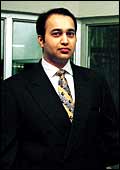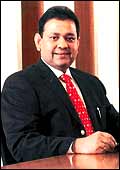|
Current wisdom dictates that it's
mostly industries with a high "sexiness quotient"-it
services, biotech, BPO, retail and the like-that clock high double-digit
growth rates, which in turn makes companies in such industries
better placed to reward shareholders handsomely and often. Oh,
yeah? Try telling that to the managements of companies like Sintex
Industries and Aarti Industries, which make plastic water tanks
and benzene derivatives, respectively.
Core competency may be a forgotten catchphrase these days, and
few gurus are screaming "stick to the knitting" from
the rooftops of their consultancies simply because most corporations
these days do just that. A few of course don't. That, as BT's
study points out, doesn't stop them from being immensely investor-friendly.
Case in point: Indian Rayon & Industries, which operates in
a diverse range of industries, right from carbon black and insulators
to BPO, it services and insurance. Sintex Industries somewhat
bizarrely makes plastic water tanks and, well, textiles. If investors
don't seem to mind, pretty much nobody else should.
Reality check #3: Even cyclical industries can be highly investor-friendly
in an era of rapid economic growth. Great Eastern Shipping has
been consistently rewarding shareholders for years now, never
mind the vagaries of the industry in which it operates. Ditto
with engineering Goliath ABB India. Clinching the case for cyclicals
in today's business environment is that there's not even one company
from the so-called 'defensive' sectors-it services, pharma and
FMCG-on the top 10 list.
Lesson: Pledge to reward investors periodically, to communicate
with them continuously and to almost maniacally follow good governance
practices. Then go ahead and do that IPO.
What follows are pieces on BT's top 10 investor-friendly companies,
and what exactly makes them so. Note: SKF India and Century Textiles,
#8 and #10 on our list respectively, were unwilling to cooperate
for this feature and are hence not covered. Instead we've done
write-ups on #11 and #12, Bharat Electronics and Aarti Industries,
respectively.
SMOKESTACK LIGHTNING
 |
|
NAME: Amit
Kalyani
Executive Director
COMPANY:
Bharat Forge
INDUSTRY: Automotive Ancillaries
MOST INVESTOR-FRIENDLY MOVE: Acquisition
of a German forgings company
|
When a company's revenues grow at
over 30 per cent year-on-year, its investor-friendliness quotient
automatically clips. Little wonder then, Pune-based Bharat Forge,
which is today the world's second-largest forging company, ranks
#1 in our survey this year. There are many factors that make Bharat
Forge investor-friendly, but what sums it up is its growth in
the topline and bottom line. From a turnover of Rs 689.22 crore
in 2002-03, Bharat Forge hit Rs 2001.4 crore as of March 2005.
A key to that growth is the company's global strategy. In November
2003, Bharat Forge acquired Carl Dan Peddinghaus, a euro 116-million
or Rs 614.8-crore German forgings company, at a throwaway price
of euro 29 million or Rs 153.7 crore. As a result, during FY 2005,
64.2 per cent of the company's revenues came from outside of India,
making it a global company of sorts. But the company's global
strategy is not at the cost of the domestic market. During the
last financial year, Bharat Forge's revenues from the domestic
market grew by 42 per cent, and export revenue by 53.3 per cent.
The company posted a healthy 29.3 per cent growth in net profit
in FY 2005, at Rs 161.3 crore.
After growth comes transparency. Bharat Forge is amongst the
few companies that puts its management discussion and analysis
in its annual report. "We are transparent in our communication
with our investors," says Amit Kalyani, Executive Director,
Bharat Forge. The company's website has all you want to know about
the company-right from its financials and vision, to its new phone
numbers as well as driving directions to get to its plant in Mundhwa,
near Pune! Says Kalpesh Parekh, Senior Analyst at ask Raymond
James, Mumbai-based brokerage: "Bharat Forge has set a benchmark
amongst ancillary companies for investor-friendliness."
-Swati Prasad
 |
|
NAME: C.P.
Gopalkrishnan
Director (Finance)
COMPANY:
Aban Loyd Chiles
INDUSTRY: Oil exploration
MOST INVESTOR-FRIENDLY MOVE: Aiming
to make the oil-drilling division debt-free in 18 months
|
PSST... THERE'S VALUE HERE
Getting through to the management
of the painfully media-shy Aban Loyd Chiles is a bit like drilling
for oil-results don't come easy, sometimes they don't come at
all. From the numbers, though, it appears that this Chennai-based
provider and operator of rigs has been more successful at finding
oil than this correspondent has been at meeting the company's
head honchos. "Strong cash flows from the rig operations
are expected to make the oil-drilling division free of debt mid-way
through 2006, making it capable of targeting fresh acquisitions
for further growth," says a research note generated by ShareKhan.com,
an equities-focussed analysis firm and a part of SSKI Securities.
The note also states that Aban's oil drilling assets are around
Rs 1,325 crore. "This gives a net asset value of approximately
Rs 1,800 per share," the note adds.
Company officials defend the low-profile stance taken by Aban,
arguing that returns to investors are more important than posturing
to the external world. "We are media-shy and low-profile
by intention, not by accident. For us, investors are part owners
of the business and we have to drive value for them rather than
bask in the limelight," says C.P. Gopalkrishnan, Director
(Finance) at Aban Loyd Chiles. This stance comes as a boon to
small investors, since Aban is very wary of divulging information
to big stock-broking companies and leaving smaller shareholders
in the lurch. "Some large speculators have asked for data
on the company and we have desisted from giving it to them, purely
because we keep our smaller shareholders' best interests in mind,"
adds Goplakrishnan. The distance between Dalal Street and Chennai
just got longer.
-Rahul Sachitanand
AHEAD OF THE PACK
 |
|
NAME: S.
Chatterjee
Executive Director
COMPANY:
UTI Bank
INDUSTRY: Banking
MOST INVESTOR-FRIENDLY MOVE: Reining
in NPAs to roughly 1 per cent
|
It's not the first name you'd recall
if you were asked to name the top three or four Indian private
banks, but then perceptions don't always mirror reality. Certainly
not in the case of UTI Bank, one of the very few in the Indian
corporate sector to have embraced corporate governance in its
true spirit. Consider this: though promoted by financial institutions,
it boasts a professional board. Not just that, independent directors
do actually occupy half of the seats on the board. It gets better:
The capital adequacy ratio works out to 12.66 per cent, well above
the Reserve Bank-fixed threshold of 9 per cent. Net non-performing
asset levels too are well below industry norms, at just around
1 per cent. "UTI Bank also scores high on transparency,"
points out Shriram Iyer, Head (Research) at Edelweiss Capital.
"Their quarterly results give a very good business perspective.
They are upfront and disclose all that they are able to."
S. Chatterjee, Executive Director, UTI Bank, sums it up when
he says, "The board guards all stakeholders." It becomes
easier to do so when you've been clocking an annual net profit
growth of 45 per cent over the past five years. Even more impressive
is a 30 per cent-plus growth in 19 out of the past 21 quarters.
"We concentrate on income sources that are sustainable,"
says Chatterjee. That's exactly why UTI Bank could show growth
despite a steep fall in treasury income, from 31 per cent (as
a percentage of total operating income) in 2003-04 to 3 per cent
last year. Fee-based income came to the rescue, climbing from
17 per cent to 33 per cent. "Fee income is the real growth
story for the coming years," stresses Chatterjee. Watch this
space-rather, watch UTI Bank.
-Narendra Nathan
 |
|
NAME: Bharat
Sheth
Managing Director
COMPANY:
Great Eastern Shipping Company
INDUSTRY: Shipping
MOST INVESTOR-FRIENDLY MOVE: Paying
dividends for 21 years at a stretch
|
BOUNTY AHOY!
A 21-year uninterrupted dividend-paying
streak in a highly-cyclical business like shipping is no mean
feat. And just in case there still exist long-faced shareholders,
Great Eastern (GE) Shipping has been generous in doling out rights
issues and bonuses, and has also concluded two share buyback programmes.
That GE Shipping can thrive in an industry that has its periodic
downcycles is thanks to the management's ability to reduce the
cyclicality of earnings. This is done by actively hedging projected
future earnings in global markets. For instance, roughly 55 per
cent of GE Shipping's current year earnings are already covered
(such information is revealed on a quarterly basis, segment-wise).
It's such hedging that's played its part in keeping investors
satisfied with chunky returns-the company generated a return on
net worth of 43.8 per cent last year.
Not surprisingly, then, GE Shipping is one of those few companies
with the lowest number of investor complaints. Analysts love GE
Shipping for its corporate governance and transparency policies.
"On a 10-point scale, GE Shipping will score eight on transparency",
says Sachin Kasera, Senior Analyst at Pioneer Intermediaries.
"And on the corporate governance issues, the score is higher
(9/10)", he continues. "Everybody associated (or expecting
to be associated) with our company has the right to be informed
and it is our obligation to provide the same", says Bharat
Sheth, Managing Director. For good measure, the company has been
coming out with weekly updates on the shipping industry for the
last two and a half years. GE Shipping may be operating in an
industry fraught with uncertainty, but there's little cyclicality
when it comes to shareholder information.
-Narendra Nathan
SAFE AS HOUSES
 |
|
NAME: V.K.
Chopra
Chairman and MD
COMPANY:
Corporation Bank
INDUSTRY: Banking
MOST INVESTOR-FRIENDLY MOVE: A
65 per cent dividend even though profits fell
|
One surefire way of keeping the
investor satisfied is to keep those chunky dividends coming-even
when the bottom line takes a hit. That's how Corporation Bank
stays investor-friendly: even when profits came down by around
a fifth last year, this Mangalore-based bank decided to reward
its shareholders with a 65 per cent dividend (compared to a 60
per cent one in the year before). What's more, there were few
eyebrows raised in the fastidious analyst community simply because
the drop in profits was more because of aggressive provisioning
rather than any fundamental reversal. In fact, Corporation Bank
(in which Life Insurance Corp. has a 27 per cent stake) might
have scored a few brownie points with analysts for such a prudent
move. "In a borrowers' market, Corporation Bank has been
able to hold its own. Our net NPAs are in the range of 1.12 per
cent of total advances while our capital adequacy ratio is at
16.2 per cent. It is this good prudent culture within the bank
that has helped us maintain growth momentum," points out
V.K. Chopra, Chairman & Managing Director.
In its centenary year, the bank has commissioned Boston Consultancy
Group (BCG) to identify areas where it needs to beef up. Based
on the firm's recommendations the bank has requested permission
from the Reserve Bank of India to operate representative branches
in Dubai, Hong Kong and Antwerp. "Nearly 15 per cent of our
deposit base comes from NRIs. In order to serve them better, we
require a physical presence in these places," says Chopra.
And to move away from the image of being a South Indian bank,
70 per cent of the expansion activities are focussed on the northern
and western markets. That should ensure the dividends keep coming.
-Venkatesha Babu
 |
|
NAME: Ravi
Uppal
MD and Vice Chairman
COMPANY: ABB India
INDUSTRY: Engineering
MOST INVESTOR-FRIENDLY MOVE: Seventeen
successive quarters of growth
|
ON CRUISE CONTROL
Its parent might be undergoing
a difficult phase (primarily because of asbestos-related claims)
internationally, but ABB India has been on a smooth ride. This
power and automation technology leader has almost doubled its
turnover in the past three years without increasing the headcount.
And in case you forgot, ABB operates in the rather sedate engineering
and manufacturing sector of the economy. Whilst the upswing in
the manufacturing and infrastructure sectors-two major target
segments for the company's offerings-no doubt have helped the
company to put in a sterling performance, it has also done well
in the power segment despite having to deal with not-so-healthy
state electricity boards. The markets have taken notice, with
the share price quadrupling in the past three years to around
Rs 1,300. Says Ravi Uppal, MD and Vice Chairman, ABB India: "Our
stakeholders have acknowledged ABB India's strong performance
over the last few years and this is reflected in our market standing."
K. Rajgopal, CFO of ABB India, adds that a sharp focus on working
capital management has yielded good results. "Our portfolio
management has also been excellent. We have 44 different streams
of business. Earlier, 80 per cent of our revenues used to come
from projects and the rest from products and services. We have
been able to change this to a 60- to 40- mix." The advantage
of such a reshuffle is more stable revenues and growth. Growth
is something ABB India knows a thing or two about-it's had 17
successive quarters of it!
-Venkatesha Babu
THE SPICE OF VARIETY
 |
|
NAME: Sanjeev
Aga
Managing Director
COMPANY: Indian Rayon & Industries
INDUSTRY: Diversified
MOST INVESTOR-FRIENDLY MOVE: Entry
into insurance in 2001
|
You won't
stumble on too many companies with as diverse a mix of old and
new-age businesses as Indian Rayon & Industries. The traditional
component comprises viscose filament yarn (VFY), carbon black
and insulators, whilst the more contemporary activities-flagged
off over the past five years via acquisitions and joint ventures-include
branded garments, life insurance, it services and BPO. Doubtless
the faster-growing, higher-margin portfolio, the new service-oriented
businesses are expected to account for at least three quarters
of consolidated revenues over the next five years; in 2004-05
they accounted for a little over half the consolidated top line.
"Indian Rayon was always a diversified company and the
new businesses will only fuel growth," points out Adesh Gupta,
Senior President & CFO. The makeover of Indian Rayon began
five years ago with the acquisition of Madura Garments. In one
stroke, brands like Louis Philippe and Van Heusen facilitated
the foray into the growing branded apparels sphere. A year later,
a JV with Sun Life of Canada for life insurance took shape; PSI
Data Systems was acquired in the same year. In 2002, Indian Rayon
bought over back-office processing firm Transworks, even as the
insulators business was demerged through a JV with NGK of Japan.
The shift in focus, away from the traditional activities, was
clearly underway.
Clearly it's not as if the new businesses will hog all of centrestage
in the years to come. "The existing businesses too are very
solid," stresses Sanjeev Aga, Indian Rayon's newly-anointed
MD. In insulators, for instance, this Aditya Birla group company
is the domestic market leader, and is #2 in the VFY and carbon
black. Esoteric businesses perhaps, but what matters to investors
is the returns they're yielding.
-Krishna Gopalan
 |
|
NAME: Amit
Patel
Managing Director
COMPANY: Sintex Industries
INDUSTRY: Plastic water tanks
and textiles
MOST INVESTOR-FRIENDLY MOVE: Holding
one-on-one meetings with investors
|
LEARNING THE ROPES
It's become fashionable these days
for India's large-cap companies to meet institutional investors
and share their plans with them. But when a relatively less-known
company from Gujarat that makes plastic water tanks begins having
such one-on-one meetings with investors, you have to sit up and
take notice. With sales of Rs 659 crore and profits of Rs 54 crore
last year, it becomes even more difficult to ignore Sintex Industries.
"We believe that correct and timely communication is the
basis of public confidence in the corporate system. And successful
centres of economic activity are those that inspire trust."
That's not some management guru pontificating; it's just Amit
Patel, Managing Director, Sintex Industries, explaining his company's
concern for investors.
Sintex Industries, which has become synonymous with plastic
water tanks (it has a 55 per cent market share in that segment),
manufactures a range of plastic products at its seven plants across
India. Rather oddly, it also has a textiles division that makes
premium men's shirting (but then again if Indian Rayon can make
insulators as well as garments, why can't Sintex make water tanks
and shirts). Says Kishore Chinai, Vice President and Head of Equities,
Tower Capital & Securities Pvt. Ltd: "The management
is very receptive and open. Even though it is a family-run business,
it has many professionals on board."
Like most frontline Indian companies, Sintex too is eyeing global
markets and has serious ambitions of tapping the European market
for shirting fabrics. Alas, those plastic water tanks may not
find too many takers in the EU.
-Swati Prasad
ON DALAL STREET'S RADAR
 |
|
NAME: Y.
Gopala Rao
Chairman and MD
COMPANY: Bharat Electronics
INDUSTRY: Defence electronics
MOST INVESTOR-FRIENDLY MOVE: Spending
5 per cent of sales on basic R&D
|
It spends 5 per cent of turnover
on basic research and development, and has close to 10 per cent
of its workforce in the labs. Must be a top-notch pharma company,
right? Not quite. We're talking about a public sector company
called Bharat Electronics Ltd (BEL), which makes electronic equipment
for the defence sector. bel designs and manufactures state-of-the-art
electronics for radars, defence communication, opto electronics,
telecommunications and sound and vision broadcasting equipment.
There's obviously good demand for such products, considering that
BEL has been able to parlay this into a growth of around 15 per
cent per annum over the last five years to reach a turnover of
around Rs 3,250 crore in 2004-05. Says Y. Gopala Rao, Chairman
& Managing Director, BEL: "This is a vindication of the
fundamental strengths of the company. Today our revenue mix is
80 per cent from defence and 20 per cent from civilan projects.
Our exports have jumped by 40 per cent in the last one year."
Rao reveals that an internal exercise dubbed 'cost reduction
for survival and growth' has yielded results. For instance, an
early warning radar, which it supplies to the Indian Army, cost
9 per cent less this year than what it did last year. "We
are always one step ahead of the curve in anticipating and meeting
the requirements of our customers," says Rao. And it's not
just defence projects alone that BEL is pocketing. Recently, for
instance, in the face of stiff competition from multinational
firms, BEL bagged a project to hook up all the police stations
in the country on a common network. Rao says his goal is to satisfy
the needs of all stakeholders: shareholders, employees and customers,
both civil and defence. That's never easy, but Rao's pulled it
off pretty spectacularly so far.
-Venkatesha Babu
 |
|
NAME: Rajendra
Gogri
Vice Chairman and MD
COMPANY: Aarti Industries
INDUSTRY: Specialty chemcials
MOST INVESTOR-FRIENDLY MOVE: A
2:1 bonus early this year
|
EASY BURN
It's bigger than many second-rung
it services companies, with revenues of Rs 688 crore, of which
Rs 250 crore are export sales. But it's pretty understandable
if Aarti Industries isn't spoken of in the same breath as a code
shop with an 'Infotech' or a 'Software' suffix. Alas, benzene-based
intermediates-which is Aarti's primary business-hardly sends the
adrenaline of fund managers, venture capitalists and headhunters
soaring. Producing basic and specialty chemicals (needed to make
polymers, agrochemicals, surfactants and pigments) may appear
unsexy, but try telling that to Aarti Industries' shareholders.
Three years after going public in 1992, Aarti announced its first
bonus issue of 1:1. Early this year it got better, with shareholders
receiving two shares for every one held. "Effectively, a
shareholder with one share in 1992 will hold six shares today,"
beams Rajendra Gogri, Vice Chairman & MD, Aarti Industries.
If Aarti can dole out such largesse at will, it's because it
is confident of at least 20 per cent annual growth. Exports will
grow even faster, at 25-30 per cent, because specialty chemicals
attract a large clientele from Europe. Indeed, there exists a
huge demand from developed countries, where the cost of manufacturing
is roughly 30 per cent higher than in India. This doesn't mean
that Gogri is ignoring the Indian market, although the consumption
of specialty products isn't too high in India. The company's plant
in Tarapore (in Maharashtra) has received USFDA approval, which
will make it a supplier to reckon with in the pharma sector. Any
roadblocks ahead? "There has been some fluctuation in benzene
prices and we hope that will stabilise." Benzene may be volatile,
toxic, inflammable and all that, but it's also pretty rewarding
for Aarti Industries.
-Krishna Gopalan
| A GRUELLING SELECTION PROCESS |
Screening
Companies listed on the BSE and the NSE, with a market cap
of over Rs 250 crore as on March 31 2005, were selected. This
shortlist comprised 412 companies. This list was further refined
to include only those companies that outperformed the BT 50
during the last three years, cumulatively as well as on a
year-on-year basis. This is to make sure that only companies
giving consistent returns are selected. Only 97 companies
cleared this level.
There are seven parameters on the basis of which the final
list was drawn up:
1. Return to investors: 25 marks. This is measured
by the share price (adjusted for right/bonus, etc.) appreciation
for the last three years. The companies that have given
more than 1,000 per cent return (total and not annualised)
got the full 25 marks. Else, they were scored on a proportional
basis.
2. Concern of managements for investors: 75 marks.
This is further divided into five subheads and each of them
carries 15 marks each.
3. Regular dividend distribution: We have considered
the average dividend payout for the last three years. Companies
with more than a 100-per cent average dividend payout got
the full 15 marks, while the ones below 10 per cent didn't
get any. Else, they were scored on a proportional basis.
4. Declaring shareholder information on time (the lag
between the quarter-end and the declaration date): Companies
where the average gap (for the last four quarters) is less
than 10 days have got the full 15 marks. And the ones where
the gap is more than 25 days got no marks. For those in
the 10-25 day bracket, marks were allocated on a proportional
basis.
5. Number of investor complaints: Big companies
with large shareholder bases will obviously have more absolute
complaints. So, what we have considered is the average investor
complaints (for the last four quarters) with the public
holding (in Rs crore). Companies for whom the average investor
complaints are more than 1 per Rs crore of public holding
did not get any marks. Else, they were scored proportionately.
6. Conducting the AGM on time: Companies that have
conducted the AGM within 60 days of their year-end got the
full 15 marks. The ones that have waited for more than 180
days get no marks. For companies where the gap is between
60 and180 days, marks were allocated on proportional basis.
7. Declaring quarterly results on time: Companies
that took less than 15 days over the last four quarters
to declare results got the full 10 marks. Those that took
more than 30 days got nothing. For companies with a 15-30
day gap, marks were allocated on proportional basis.
And finally the sanity test: Companies that scored no
marks on any of the above parameters were eliminated. And,
as an additional safeguard, only companies with a minimum
average daily turnover of Rs 1 crore (on BSE+NSE) were considered.
|
|













